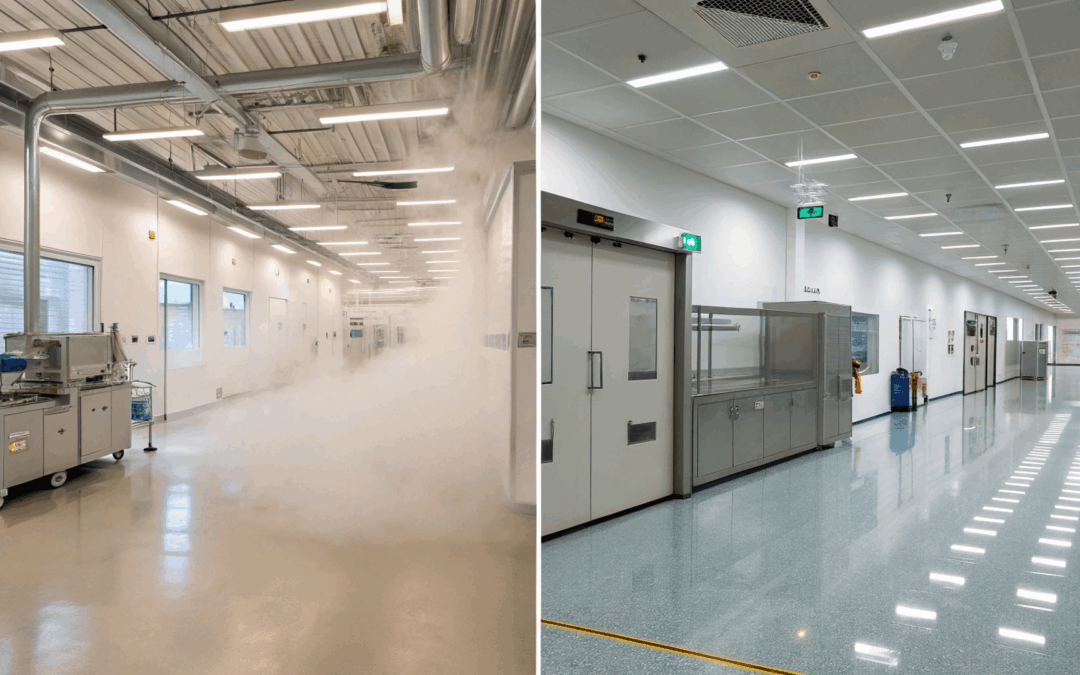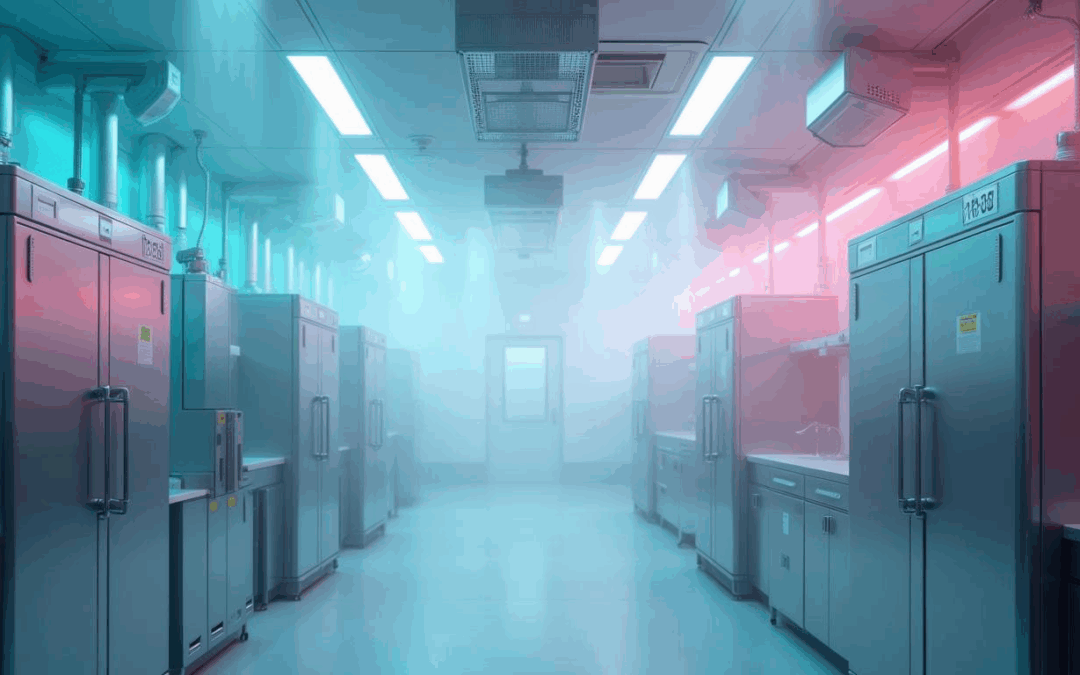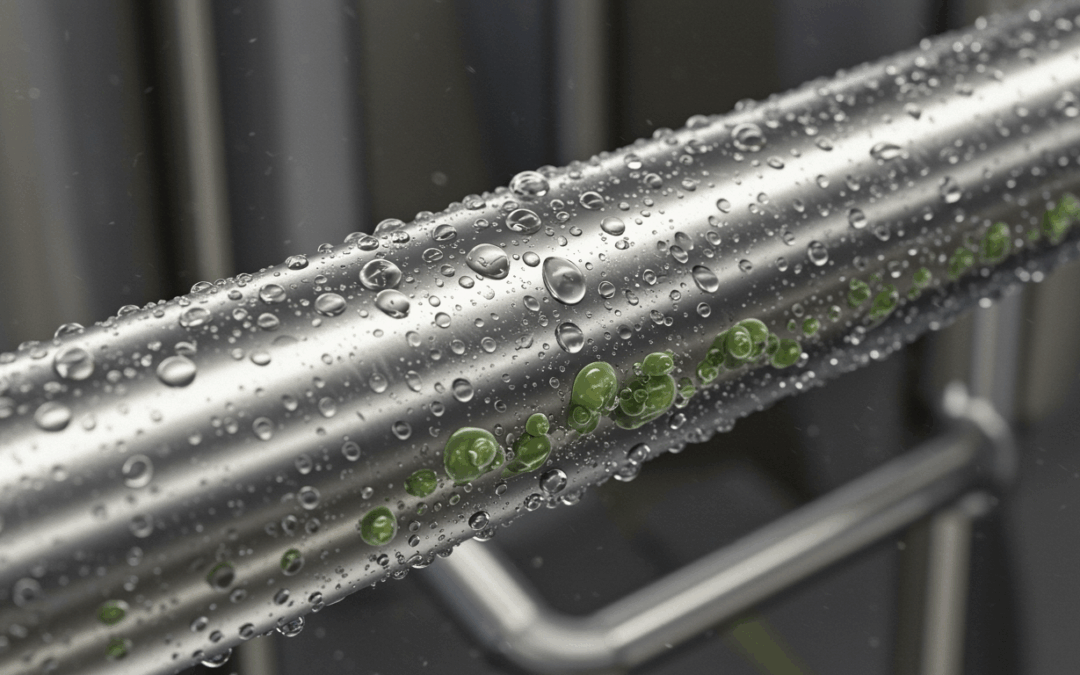There are many environments that need to be kept dust-free for a variety of reasons. Dust suppression methods such as bag houses and electrostatic precipitators are complex systems that are extremely expensive. A cheaper, simpler option is to install a commercial humidifier to create a dust-free environment. The micron droplets produced by the humidifier attract and suppress dust particles, leaving the room clean and dust-free. These humidifiers control dust, bacteria, viruses, and mold, all while maintaining precise humidity levels. The technology in these humidifiers is advanced, but the humidifiers are also easy to install and require little maintenance.
How Does a Commercial Humidifier Suppress Dust?
Research shows that humidifiers using under 10-micron water droplets will attract and suppress PM 10 and smaller dust particles. Smart Fog humidifiers produce 4.2 micron droplets allowing for a 100% dust suppression rate. The micron droplets create the desired humidity in the room, but they are so small that they completely evaporate before ever hitting a surface. This means that the surfaces in the room will never get wet.
4 Environments that Need Dust Suppression Technology
Dust suppression is needed in certain environments. Some reasons for this include protecting the health of the people in the environment and keeping equipment safe. While most don’t think of dust as being harmful, in certain environments, dust can be dangerous and needs to be suppressed.
Medical Labs
It is crucial that medical labs are a sanitary, dust-free environment. Labs are used for things like research or testing patient samples. Any amount of dust could contaminate a sample, making it impossible to do proper testing or research on it. Thus, medical labs need to invest in dust-suppression technology. A commercial humidifier is a great option. Not only does it suppress dust, it also suppresses bacteria, viruses, and mold. These three contaminants should not be in the lab as well. In addition, due to the samples being tested, most medical labs need to be kept at a certain level of humidity at all times.
Print Press
A print press is another environment that needs to be kept dust-free. As books, magazines, newspapers, etc., run through the press machines, they are freshly inked. If dust were to get on the pages, it could ruin the quality and consistency of the print. Dust in and on the presses could affect the functionality and life of the machines. In addition to avoiding dust, print presses need to be kept at certain levels of humidity. If the levels of humidity are off, issues like paper jams, paper curls, web-breaks, static build-up, and mis-registers can occur. These types of issues cause printing presses to waste a lot of time, money, and resources. Installing a commercial humidifier in the printing press room will lead to high quality prints. It will also reduce the amount of reprinting.
Data Center

Data centers are large warehouses that are dedicated to housing IT equipment required for computing and networking. These centers are where data is stored, processed, and sent out to necessary locations. Did you know that the data center capital of the world is right here in the U.S.? Ashburn, a city located right outside Washington, DC, is where 70% of the planet’s internet traffic flows through each day. In order to keep the computer and network equipment running in tip-top shape, data centers need to be a certain temperature and maintain a certain level of humidity 24/7. A commercial humidifier will produce the needed, non-fluctuating humidity while also providing a cooling solution for the environment. In addition, these centers cannot have any dust. Dust can get inside the equipment which can ruin or reduce the effectiveness of the machines. A commercial humidifier will ensure that this dust is 100% suppressed so that it does not harm the computer equipment.
Clean Room
A clean room is a controlled environment that filters out things like dust and airborne organisms. Clean rooms are used for things like medical research, manufacturing of pharmaceutical products, and manufacturing of electronics. The rooms must be kept 100% dust free. Whether a medication is being manufactured or electronics like cell phones, dust cannot get on or into these items. With the case of medication, that would be extremely dangerous to the patient. In the case of the electronic item, it could ruin it. A commercial humidifier should be used to suppress the dust. The humidifiers also suppress bacteria, viruses, and mold which are toxins that should never be in a clean room. The humidifier will help with static-control and any cooling that is necessary.
A Smart Fog commercial humidifier is ideal for many environments because it features 4 different functions all within one system. The humidifiers provide precise humidity control, fumigation/sanitation, cooling, and dust suppression/static elimination. Dust suppression is a feature that is needed in environments like medical labs, print presses, data centers, and clean rooms. These rooms need to be kept dust-free in order to protect the processes that occur inside of them.
A great dust suppression system is a Smart Fog humidifier. These systems are easy to set up with a simple plug and play installation process. The humidifiers contain no moving parts, so they rarely require maintenance. There are different humidifiers to choose from based on the specific environment they are needed in. Smart Fog makes direct space, in-duct, mobile, and fog tunnel humidifiers. Smart Fog has the smallest droplets in the humidifier market at 4.2 microns. This tiny droplet allows for the humidifier to reduce dust, viruses, bacteria, and mold in the environment. In addition, the small droplets provide humidity in the room without wetting the surfaces thanks to the 100% evaporation rate. For more information about humidifiers and dust suppression technology, contact Smart Fog today.





